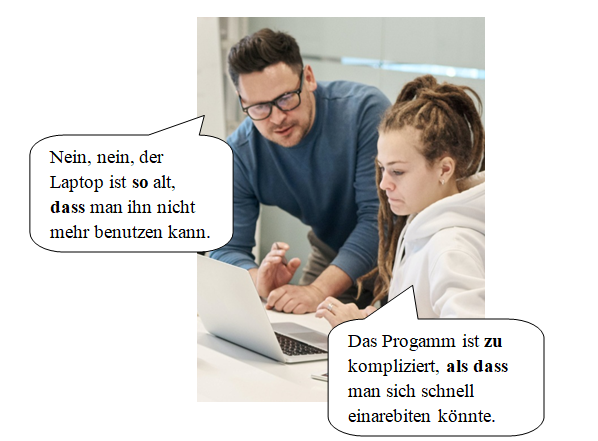In this lesson, you will learn all about consecutive sentences and conjunctions sodass, so dass and als dass, what they mean, and how they are used.
Thank you for reading this post, don't forget to subscribe!CONTENTS
Sodass
So…, dass
Ohne dass
Als dass
Sodass
“Sodass” conjunction has a consecutive meaning. This means that the consecutive sentence contains a reason that leads to the result. The main clause describes a reason, and the sodass-clause describes the result.
For example:
Alex hat seine Fahrprüfung bestanden, sodass er jetzt Auto fahren darf. – Alex has passed his driving test and is now allowed to drive.
Er war krank, sodass er den Termin beim Friseur absagen musste. – He was ill, so he had to cancel his appointment with the hairdresser.
Es hat sehr stark geregnet, sodass sie mit dem Auto zur Arbeit fahren muss.- It has been raining heavily, so she has to drive to work.
Das Projekt muss nächste Woche fertig sein, sodass wir viel Arbeit haben. – The project has to be finished next week, so we have a lot of work to do.
Ich habe kein Geld für Urlaub, sodass ich zu Hause bleibe. – I have no money for holidays, so I stay at home.
Er war spät, sodass er den Zug verpasst hat. – He was late, so he missed the train.
Der Accu von meinem Handy is leer, sodass ich deine SMS nicht lesen konnte. – The battery of my mobile phone is empty, so I couldn’t read your SMS.
Sodass is a subordinating conjunction that introduces a subordinate clause. In the subordinate clause, the verb comes at the end.
The consecutive clause with “sodass” always comes after the main clause. It is not possible to switch between the main and subordinate clauses.
The linking adverbs “deshalb,” “deswegen,” “darum,” and “daher” connect two main clauses and they can replace the conjunction “sodass“. One more important fact is that they come in the second main clause.
For example:
Es war wieder sehr laut, deshalb konnte ich nicht schlafen. – It was very loud again, so I couldn’t sleep.
Er sucht einen neuen Job, deswegen liest er jeden Tage den Stellenmarkt in der Zeitung. – He is looking for a new job, so he reads the job market in the newspaper every day.

So…, dass
The word “sodass” can be separated with “so” in the main clause, followed by an adjective, adverb, or noun. The consequence is then expressed in dass-clause as a result of the action in the main clause.
For example:
Sie war so krank, dass sie die Feier absagen musste. – She was so ill that she had to cancel the party.
Es regnete so stark, dass die Stadt überschwemmt wurde. – It rained so heavily that the city was flooded.
Sie ist so gestresst, dass sie nichts gegessen hat. – She is so stressed that she hasn’t eaten anything.
Er ist so fleißig, dass er schon alles erledigt hat. – He is so hard-working that he has already done everything.
Sie ist so glücklich, dass sie den ganzen Tag singt. – She is so happy that she sings all day long. Er ist so
Er ist so intelligent, dass ihm das Lernen keine Mühe macht. – He is so intelligent that he has no trouble learning.
Alternative
genug
Du bist groß genug, dass du allein ins Ausland fahren kannst. -You are big enough to travel abroad on your own.
solch-
Er hat solches Fieber, dass er phantasiert. – He has such a fever that he fantasises.
Ohne dass
The conjunction “ohne dass” can have a consecutive meaning in addition to the modal meaning. Here, the dependent clause refers to the absence of a consequence that should occur as expected, due to the action in the main clause. This is actually a negative consecutive sentence.
For example:
Ich kann nicht einschlafen, ohne dass apsolute Stille herscht. – I cannot relax well without absolute silence.
Mia hat sehr viel Schokolade gegessen, ohne dass ihr schlecht wurde. – Mia ate a lot of chocolate without getting sick.
Die Kinder schwammen im kalten Wasser, ohne dass sie sich erkälteten. -The children swam in the cold water without catching a cold.
If the main and subordinate clauses have the same subject, the infinitive conjunction ohne…zu is usually used
For example:
Die Kinder schwammen im kalten Wasser, ohne sich zu erkälten.
Als dass
Sentences with “als dass” express a negative consequence. They consist of two parts. “Zu” stands in the main sentence before the adjective or participle, “als dass” introduces the dependent clause. The dependent clause with “als dass” is in the subjunctive II.
In the main sentence, some exaggeration with “zu” is shown, and based on that, in the dependent sentence, the expected ending is missing which starts with als dass. The modal verb können and/or the subjunctive (irrealer Konsekutivsatz) often appear in the dependent clause.
Dependent conjunction: als dass + können and/or the subjunctive
In the main clause it must stand: zu
Compare the sentences in the following examples:
PRESENT
so…, dass + negation + present indicative. = zu…, als dass+ past subjunctive
Das Wasser ist so kalt, dass man nicht baden kann. Das Wasser ist zu kalt, als dass man baden könnte.
The water is so cold that you can’t swim. The water is too cold to swim.
PAST
so…, dass + negation + past subjunctive = zu…, als dass + pluperfect subjunctive.
Das Wasser war so kalt, dass man nicht baden konnte. Das Wasser war zu kalt, als dass man
hätte baden können.
The water was so cold, it was impossible to swim. The water was too cold to swim.
Instead of the subjunctive, the indicative can appear, but with an unrealistic(ireale) meaning.
- present
Das Wasser ist zu kalt, als dass man darin baden könnte/kann.
- past
Das Wasser war zu kalt, als dass man darin hätte baden können/ man darin baden konnte.
If the subject in both sentences is the same, then the infinitive construction with zu … um zu can be used instead of the conjunction als dass.
If the subject in the main and dependent sentence is the same, then instead of the conjunction als dass, the infinitive construction um + infinitive with zu can be used.
Mia ist zu krank, als dass sie das Bett verlassen könnte
Infintive construction:
Mia ist zu krank, um das Bett verlassen zu können
Mia ist zu krank, um das Bett zu verlassen.
Alternative
The facts in the main clause take precedence over the facts in the dependent clause. (=anstatt dass). The dependent clause always comes after the main one. In the main sentence, the comparative lieber, besser must be present.
Er fuhr lieber mit dem Bus, als dass er den weiten Weg zu Fuß machte.
| zu …. , als dass + subjunctive II | so …, dass + negation |
| Das Wasser ist zu kalt, als dass man darin baden könnte. | Das Wasser ist so kalt, dass man nicht darin baden kann. |
| zu …, um zu+ infinitive | so…, dass … + negation |
| Das Wasser ist zu kalt, um darin baden zu können. | Das Wasser war so kalt, dass man nicht darin baden konnte. |
See more:



